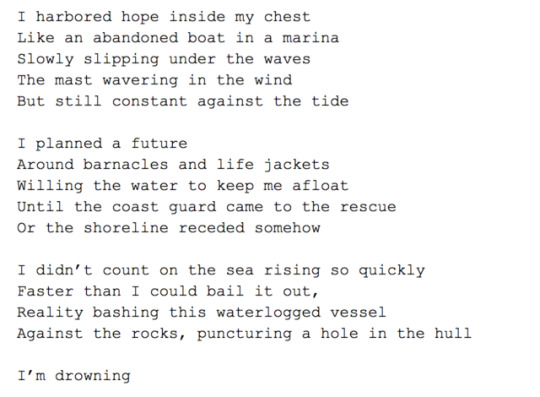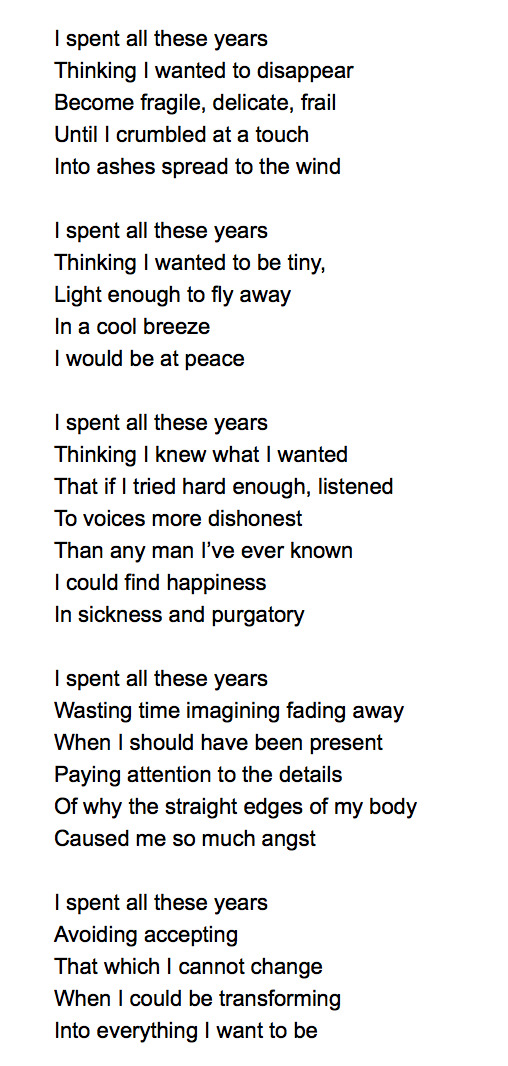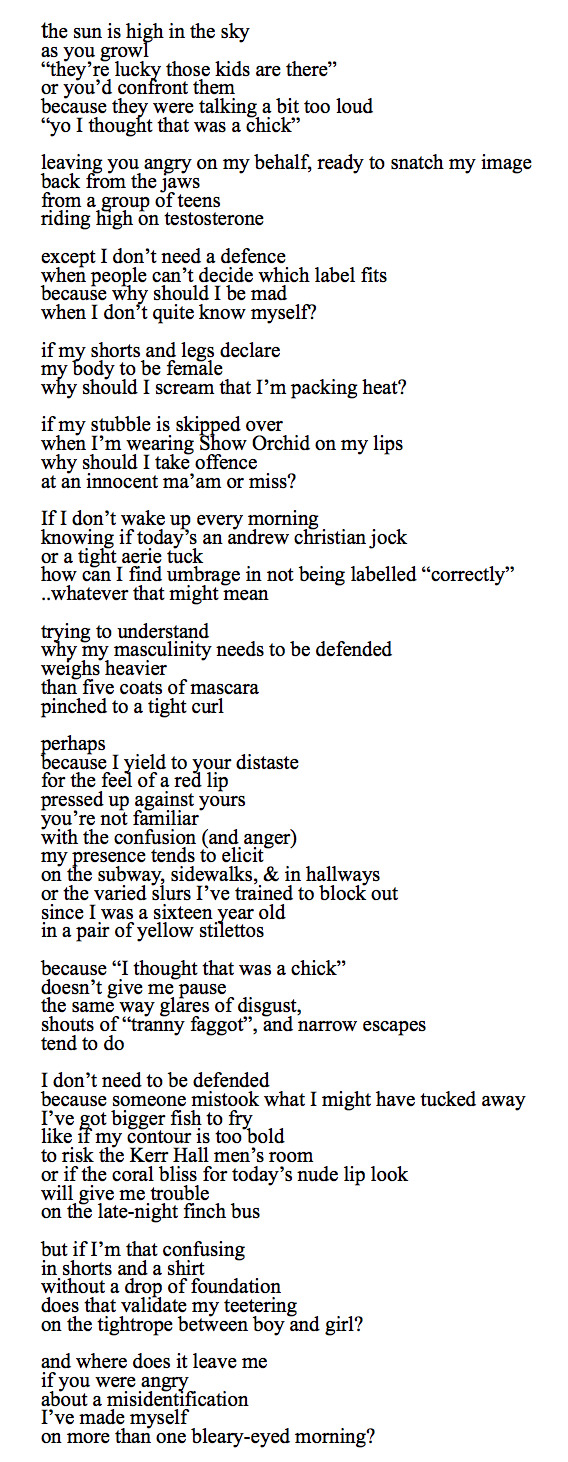Text
RP Month 2019!
Those of you who have had the (mis)fortune of following me on social media for a while, you know February is Retinitis Pigmentosa Awareness Month. Which means I get to write a bunch about myself and my life and nobody can judge me too hard about it! Yay! I thought this year I’d try to be a bit more #enlightened and talk about language surrounding visual impairment and the ableism that is so persistent in our lives. (For reference, I’ve already written a bunch about my diagnosis and what dealing with it has been like). If you don’t want to read a whole lot of words, here’s a brief summary and some updates.
- I was diagnosed with retinitis pigmentosa in the fall of 2015 with an approximately 60 degree field of vision (180 degrees is ‘normal’
- I was told I would likely be legally blind by 40, if not by 35
- I was referred to the CNIB and started accessing their services (such as orientation and mobility training, getting a CNIB bus pass) in the spring/summer of 2016
- In 2017, my peripheral vision continued to erode and I lost roughly 1/3rd of my visual acuity in my right eye
- As of my most recent eye appointment, my field of vision has degraded to about 25-30 degrees (combined). I have no peripheral vision at all at this point.
- Based on the rate of my vision loss since my diagnosis, I’ll probably be legally blind far before my doctors’ initial estimation (legally blind is defined as an individual having a 20 degree or less field of vision)
- I went back to school (yay me!) last month and I’ve been *pretty* good about using my white cane to get around and forcing myself to get more comfortable with my reality as a ~blind~ person
And that’s what you missed! I’m also gonna sprinkle in some of my favorite RP Truth memes because they’re wonderful and make me feel seen (no pun intended). So having lived in this shit for the past few years and having to…let people know what’s going on, I’ve heard a lot said about my vision loss from (often) well-meaning people. Probably my biggest pet peeve re: vision loss talk is the initial conversation I have with people when they either find out about my condition or when they feel comfortable asking me about my blindness. Inevitably, the first question people leap to is “is there a treatment? Is there a cure?!”It’s an innocent enough set of questions, and I truly believe there’s good intent behind asking them.
The issue I have is that, with my condition, there…isn’t. There is no viable course of treatment, nor is there anything resembling a real-world cure. Which inevitably leads to “well they’re doing great things with rats and genetics and science is wonderful I know they’ll have a cure for you soon!” Which, again, is meant to sound supportive, encouraging, and positive. It’s what people have trained themselves to say when they’re confronted with something like blindness.
Think about this conversation for a moment. It is inherently ableist. The entire sequence (and it’s a very predictable one once you’ve sat through it a few dozen times at minimum) suggests that the only response to losing one’s vision is to immediately *fix* the problem. It tells people like me that we’re broken. That we need to be solved. It tells me that a reality where I just *accept* my genetic coding isn’t a viable one. That the thought of existing while blind is so disturbing that it should be completely leapt over to fixing the problem so that scenario never happens. Sure, it’s not intentional. That doesn’t change the meaning behind those words, well-intentioned as they tend to be. The words are ableist because they imply that I could not be productive, or valuable, or happy the way I am. They say that I must want to change a fundamental part of my existence. Why? Why is the default not to ask
- How are you handling this?
- How can I make this easier?
- What are your plans for the future?
- Do you have the support you need?
- Can I make this space more accessible for you?
Those questions don’t spring into people’s minds because our society has so deeply ingrained ableism into our vocabulary that we act on the presumption that it is the disabled individual’s existence that needs to be altered, and not the environment that sets them up on an unequal playing field.
Telling me that I should hold out hope for a cure that may never come, or may never be accessible to me, is akin to telling me that I should just lay down and let the world do her thing and passively accept whatever comes. I understand fully that when people have this conversation with me they aren’t *actually* trying to make that statement. Five years ago, those are the questions I would ask. I struggled for a really long time (fuck, I still struggle) to just accept my reality- to accept that this was simply something I was going to live with and that I needed to work within the circumstances I had been given. That, however, does not absolve people from the responsibility to look at why they are so uncomfortable with the thought of someone not being wholly invested in being “cured” or why I might not be interested in investing my energy into hoping and dreaming for science to bring back my vision.
Why do we think a life with vision loss is such a devastating notion? Why is my lack of peripheral vision such a scary thing people to think about? When we skip over these questions, we skip over what really matters: that the society we inhabit is not designed for people with disabilities. We focus all our energy into fixing disabilities because we’d rather ignore how poorly individuals with disabilities are treated and how inaccessible we have made the world for them.
I’m not able to speak for people who have other disabilities than mine, or even those who have different forms of vision loss than me, but I encourage you to seek out their work if you’re so inclined. We all experience our environments differently, but I think it’s safe to say the consensus is that living with a disability isn’t necessarily the problem – the problem is how we are expected to behave with our disabilities. We are expected to return to an “able” state as quickly and inspirationally as possible, or to step back and become passive members of society so as to not trouble the abled people around us.
Existing as someone who is blind is not revolutionary. I am not revolutionary for returning to school for a career that is more in line with the abilities I have now and will have in the future. I am not revolutionary for navigating downtown streets with a white cane. I am not revolutionary for holding down a job – and being *good* at that job (although given 80% of people who are legally blind are unemployed…it’s easy to see why that’s an assumption). I am not revolutionary for getting coffee from Tim Horton’s in the morning. I am not a token for you to look at and say “and we think we have problems” while gesturing to your coworkers. That’s some next-level ableist bullshit. All I wanted was a double double that morning, and that lady at the counter thought it was acceptable for her to treat me as an example of how cruel life could be. She dehumanized me. Fuck that shit.

I’m going to go a little bit off on a side tangent here; feel free to skip down a lil’ if you’d rather not read this rant. In addition to the above, you know what else is not revolutionary? My love life. It is not revolutionary that I have a partner who loves me. It is not revolutionary that Joey deems me worthy of his time, or his respect, or his love. He does not get an award for being audacious enough to be in a relationship with someone who is disabled. He does not get to be the ‘better’ partner in our relationship because he is willing to somehow be chained to my crippled existence. We joke about it, because humor is how I cope with a lot of things, but at the end of the day, he is not *brave* for “seeing past” my blindness. So when you see us looking cute on the gram or him by my side at the mall when I’ve got my cane out – don’t chalk him up to being a wonderful supportive partner because he is willing to accept my disability. Joey is a wonderful and supportive partner because he gives me space to explore who I want to be. He is a wonderful and supportive partner because he is without fail by my side even when I do a shitty job of prioritizing him. Joey is a wonderful and supportive person because he wants me to be independent. His love has been unconditional for over seven and a half years, and my diagnosis did not change his love for me. Do not disrespect his loyalty and love for me by suggesting he is the best example of what a man can be because he doesn’t treat me differently for my blindness. That’s the goddamn minimum. That is the lowest bar to meet. I am fucking worthy of love with or without my vision, with or without my hearing. My value is not tied to how able-bodied I may or may not be.
My abiity to pretend to be able bodied is not something to applaud me for. I am very good at pretending to see more than I often can – to the point where I’ve had people who’ve never seen me use my cane be shocked when they find out how little vision I have left.

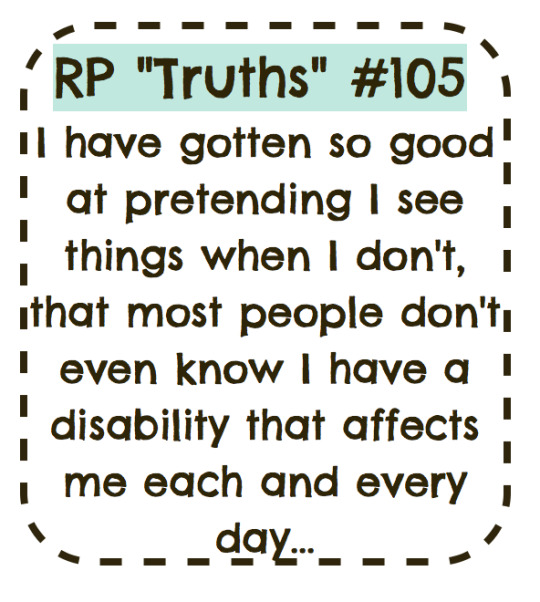
I am not revolutionary for giving back to my community through my volunteer work. Blind people are not heroes for doing the same things you and the able-bodied people around you do.
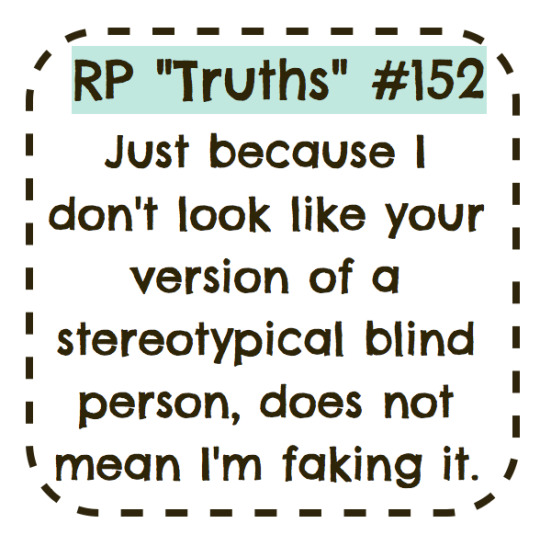
Do you know why inspiration porn exists? It’s because our world expects disabled people to fail. It’s because deep down, you know how little thought is given to making accessibility the default. You know that disabled people have to work harder and do more to be “normal” just because of the way things are. That’s why you ask me when I’ll be cured.
The idea of someone being visually impaired and not having an escape plan from that reality is deeply uncomfortable, because it means confronting how basic things are designed to be exclusionary.
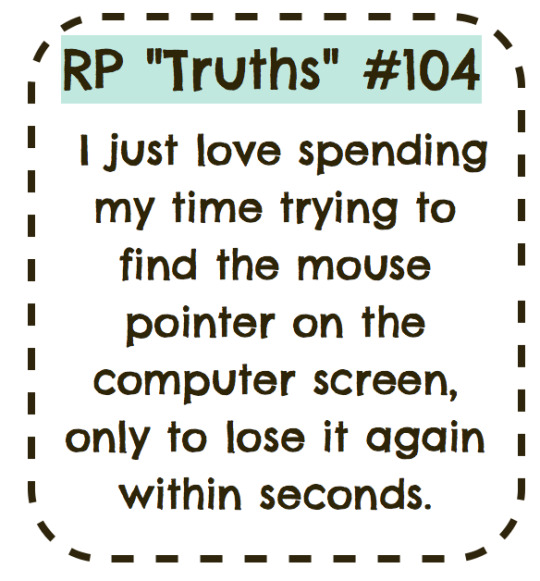
It means realizing how shitty this city is to navigate as a pedestrian. It means noticing that we’re okay with people placing any and all manner of obstacles in the middle of sidewalks, from signs, to bowls of water, to clothing racks. It means recognizing how little people give a fuck about others. Just today as I was making my way downtown (walking fast, faces past) on the subway, a man with a seeing eye dog got on the train. Who do you think was the only person on the entire train who thought to give him their seat? It was me and my white cane who gave up their seat – while the lady next to me bent over in her fucking seat to pet the man’s SERVICE DOG. I was livid.
We pretend to be doing our part to be ‘inclusive’ and ‘improving accessibility’ while avoiding doing the actual work. The TTC for example, gives the CNIB transit passes to distribute to their clients so they can access public transit for free. I’d love to applaud them for that. I cannot, however, because they apparently forgot to train their employees on how to deal with visually impaired people who use the cards. It is *not*, as occurred the other week, to berate riders about not “showing the card properly” or “not waiting for an empty bus” and then getting on the intercom to lecture said rider about how “if they were smart enough to be going to school they should be smart enough to ride the bus” in front of sixty people. That is no accessible. It is not accessible when I complain both publicly and privately to the TTC about said incident and their initial response is not to be outraged that the incident took place, but rather to let me know their vehicle operators are “trained in how to accept fares”. (It’s been over two weeks since I submitted an official complaint. I’ll let you guess if I was graced with any formof a response other than a “we received your complaint” form email). The TTC is ableist. The TTC is a problem.
The problem is not my vision. The system is designed to burn us out so we don’t scream about the injustice of how we treat people whose DNA skipped a few lines. It’s exhausting trying to keep up with people who don’t have to give a second thought to where curbs are, or which seat on the subway is the easiest to get off from, or remember which set of stairs has the awkward landing on it, or how to hold a cane and a backpack and a phone at the same time. I’m okay with that though, because I’m learning to adapt. I’m unlearning a lifetime of ableist thinking. I’m proving my worth to myself. I’m doing good.
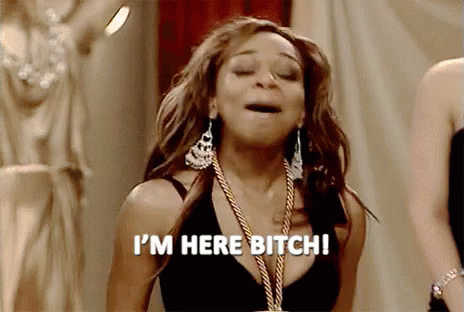
Just please stop asking me about a cure. I don’t have the time, because I’m busy trying to get my coffee (probably).
3 notes
·
View notes
Text
Here’s What I’m Mad About Today!
The other day I was commuting home with a group of people, shooting the breeze and talking about nothing in particular when the topic turned to one of theirs’ sex life. She mentioned something about unprotected sex and how she only has sex with people she trusts not to have anything. As I’ve done in the past, I pointed out that this was a terrible idea for a multitude of reasons including:
potential pregnancy
a partner not knowing their STD/HIV/AIDS status
fuckboys knowing and lying about their status
I didn’t broach the issue of her slut-shaming people who sleep with more than just a few select ‘trusted’ partners, because ya girl isn’t always out here looking for a fight. Her response was in essence that, again, she only sleeps with partners she can trust, and that in any case, she’s been told that “only 1 in like a thousand actually get it”.
Now here comes the part I’m mad about: when I pushed back and suggested that she could easily be that 1 in 1000 so she should still be using protection, her comeback to me was that my input was irrelevant (maybe fair? Your body your choice and all that) … and that I only cared so much about HIV/AIDS because as a gay person I *had* to be careful about it.

Which is problematic.
On a lot of levels.
I pointed this out and was told that she “doesn’t see how it could be problematic”.
So now I’m mad about it and ima break it down for y’all.
The first issue I take umbrage with is her assertion that she only sleeps with partners she trusts, and that this therefore keeps her free of any risk of exposure. What that essentially boils down to is this: people with HIV/AIDS aren’t trustworthy. There’s a lot of stigma surrounding being positive - and a lot of it has to do with attitudes like this from people who are woefully uneducated about how transmission happens and assume that people who are positive are dirty, or promiscuous, or somehow “deserving” of getting AIDS. People can get AIDS from a blood transfusion, sharing a dirty needle, sex with an unfaithful partner, be born with it, etc etc. It is not a thing that only sluts who walk down the street with their prolapsed anuses out thirsting for any and all the dick they can get have.
Moving on from that is the assertion that I *have* to be careful about HIV because I’m a gay person. This goes back to the idea that people with HIV “deserve” to have it - and to the stigmas surrounding the LGBT community at large. HIV used to be known as Gay-Related Immune deficiency (GRID for short) because the assumption was that it only affected gay men. The gay community is still associated, for better or for worse, with promiscuity - and HIV was seen for a long time as the punishment for the sexual revelry that apparently is intrinsic to the homosexual experience.
To make the leap from “you could be someone who gets AIDS from unprotected sex” to “that’s a you problem because you’re gay” is an attack that reveals a deep ignorance and latent homophobia. It implies that all gay men are somehow untrustworthy; that enough of us are ‘diseased’ that the entire group needs to be regarded with suspicion. If that was simply her woefully ill-informed opnion, that would be one thing, but the problem is that it is not. Her misperceptions are writ large in our country. To this fucking day, I cannot donate blood. Despite having been in a monogamous relationship for my entire adult life, I am regarded with an unhealthy level of suspicion because I am a man who loves and has sexual relations with men. I cannot in good conscience label myself as an organ donor because that would mean upon my death having my loved ones subject to scrutiny about my sexual history before my organs can be taken to help someone else. After they sign a safety waiver acknowledging the “risk” my organs might present to them.
Telling me I need to be wary of HIV as a gay man and you do not as a woman sleeping with men is to tell me that my community *is* rightfully discriminated against by blood banks and health organizations, despite the scientific evidence stating otherwise. It is telling me that the doctors when I was in a treatment program for my mental illness were right in testing me, and me alone, for HIV. That they were right to single me out based on my sexuality as having a disease that the other seven people in the same program as me weren’t even considered to have. And those were people who were trying to help me - a team who helped to save my goddamn life. They weren’t acting maliciously. They were just operating under the assumption that, like this girl, as a gay man AIDS was a major factor in my life.
But this girl doesn’t need to worry about that - she’s only having sexual intercourse with people she “trusts” who are “clean. Unfortunately, the facts aren’t in her favor: some 30% of people living with HIV straight-up do not know their status. In addition to that, close to 25% of all new HIV cases diagnosed...are heterosexuals having good ol’ pure heterosexual sex. 20% of those good, righteous heterosexuals who contracted HIV? Women.

What really grinds my gears about all this, as well, is that I work within and outside the LGBT community to push back against the sort of stigma she sees fit to spew out. I was a team lead for Pride Toronto this year; our theme was ‘35 Years of Pride Activism’. We hosted seminars to educate the public. We honored AIDS activists in our parade. We mourned those we’ve lost. We continued to do valuable work so that the fucking two hundred thousand people who died of AIDS while government officials called it “the gay disease” would not have died in vain. So you can imagine the level of disrespect I felt to have someone tell me she didn’t need to worry about AIDS because she’s not gay.
The sad part, to me, is that if her opinion of me is low enough to suggest that *I* should be worried about AIDS, what does she think of the people who are less ‘clean’ than me? I’ve been with one partner for seven years. I don’t use drugs. I’m sober. I’m basically an honorary straight at this point I’m so far from the stereotype of the typical slutty gay man at this point. So what does she think of the gay men out there having uninhibited sex with whomever they please? Who use drugs? Of the trans women doing sex work to get by? Are they all beneath her?
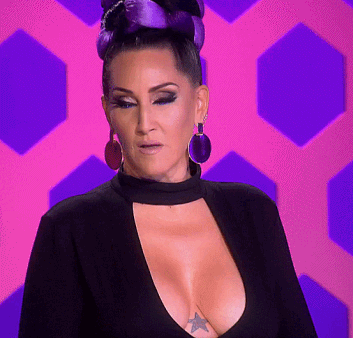
She mentioned at one point during this conversation that she’s had an AIDS scare before which...seemed at odds with her other statements, but I digress. She knowingly said to me that “I’m sure you have too, right”, to which I am embarassed to say I defensively said I had not. It was a knee-jerk response in part because I felt like I needed to defend my community - that we were in this one small interaction better than her. Part of me also just didn’t want to admit that I had had a scare. I was worried about the stigma about being judged as a gay man who came just a little bit too close to having HIV. But I have. I had a partner who I had unprotected sex with when I was a teenager who cheated on me and used intravenous drugs, and when we split up, a mutual friend messaged me to warn me to get tested because he was allegedly positive. Whether that statement was true or not, I don’t know. I tested clean. But I’m ashamed that I was worried about the perception of being “positive” - because really, being HIV+ is, at this point, not as big a deal as it once was. It can be managed with medications that can lower your viral load to an undetectable level. It is not a death sentence. And above all, it is not a fucking statement on someone’s morality, nor should it be seen as one.
It’s a simple statement to make, to say “oh, I’m not at risk because I’m not gay”. But it’s a statement that reveals a whole lot about what and how you think. It is problematic. It is offensive. Honestly, all I wanted to do was advocate for safe sex so the girl didn’t wind up with more than she bargained for from having a summer romp in the sheets. I’m not ashamed to be gay and proud. I am ashamed I’m still naive enough to forget that sometimes people can’t see past the glittery veneer and their preconceived notions. I’m not mad that I’m using my prostate to its fullest potential. I’m mad that it’s an invitation to stigmatize me with something that we need to be working to destigmatize. I’m less mad now that I’ve typed out 1500 words about it, though.
Stay blessed and love yourselves.
2 notes
·
View notes
Text
Retinitis Pigmentosa Month 2018
So I’ve been seeing a bunch of posts on social media again to remind me that it’s retinitis pigmentosa awareness month (say that 10x fast) again, so I figured I’d indulge in one of my favorite hobbies - talking about myself. I already wrote fairly extensively about my RP journey last year, so check that out if you’re looking for even more #sashagay content.
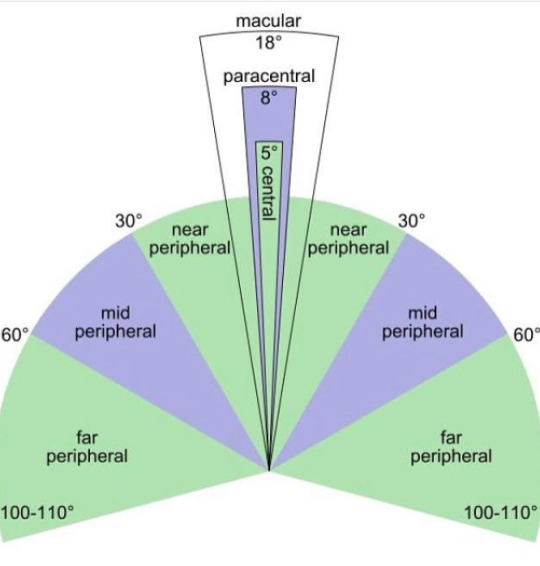
For a reference point before we get in too deep, the diagram above is what the average ‘healthy’ eye’s field of vision is - I’ve got about 20-25 degrees in each eye, and lost about a third of my acuity in my right eye last year.
I figured this year I’d sit down and write about what retinitis pigmentosa actually is for y’all. Retinitis Pigmentosa is a genetic disorder (which spontaneously appears in 50% of cases as a fun “hey y’all, plan to re-evaluate your whole life!” gift) that essentially kills off the cells in an individual’s retinas. The retina is the tissue that basically envelopes the back of your eyeball and is responsible for your ability to see, adjust to, and perceive light.
Retinitis Pigmentosa is the slow wearing down of said tissue as your night vision goes from whatever it’s supposed to be (honestly, what the fuck do stars actually look like in the sky? I’ve only ever really been able to see the moon and maybe a star here or there, fuck even trying to make out a constellation???) to...basically a gray blur with burning orbs of light that vaguely correlate to where things are/should be.

Retinitis Pigmentosa is the gradual development of tunnel vision, where your peripheral vision gets fuzzy and harder to get a grip on until one day you realize that there’s just...nothing there. It’s not being able to tell if that shape in your peripheral vision is the fur trim on your winter coat or someone who’s about to cut in front of you on your way down the stairs to the subway.
Retinitis Pigmentosa is focusing intensely when meeting anyone new, darting your eyes down and back up again like you’re the world’s shiftiest person, trying to catch when said person inevitably reaches out their hand for you to shake. Retinitis Pigmentosa is hoping that someone else is there who knows your backstory to nudge you and let you know that your friend’s new man has been holding out his hand for thirty seconds while you ignore it; hoping they’ll smooth over the awkwardness by filling in the blanks on your behalf.
Retinitis Pigmentosa is like reading a book and suddenly realizing you have no idea how the killer got in the bedroom because you’ve spaced out...but with your vision, all the time. It’s scanning the aisles at the grocery store, looking for that one brand of granola bars you know is on sale, but missing them completely because your eyes don’t focus on the details, just the bigger picture overall, because until you see exactly what you’re looking for, your eyes are just trying to see...anything.
Retinitis Pigmentosa is being in a constant state of anxiety in the front seat of a car because even though Joey’s never had an accident and your father drives like GreyPower is tailing him for a sponsorship opportunity, you just know there’s a car coming out of nowhere and if you can’t respond to it how could they possibly? It’s not being able to rationalize that their vision gives them the reaction time to see what’s coming, and instead being in a constant state of near-flinching and - holy crap why is that Honda so close to us all of the sudden?
Retinitis Pigmentosa is reading all about how cigarettes can negatively affect bloodflow to the eyes and potentially accelerate your condition’s progress so you make the decision to quit smoking, but for real this time, on your 24th birthday so you might be able to see on your 35th. It’s having all the fallout from nicotine withdrawal but with an added garnish of ‘why hasn’t my vision come back this is fucking stupid this is pointless I might as well have a fucking cigarette what difference does it make” and having to remind yourself that nothing will bring back your ‘normal’ vision and that all you’re trying to do is hold off the inevitable a little longer so you can feel somewhat whole that bit longer.
Retinitis Pigmentosa is getting glasses to correct the visual acuity you suddenly lost after always having near-perfect central vision and being super excited to be able to see clearly again. It’s realizing that because the glasses magnify your field of vision, they actually shrink your field of vision considerably to the point that when you’re moving around with them on, you find yourself walking into doorways and even more clumsy than general and feeling defeated with the whole thing, although they do look damn cute and make reading a lot easier.
Retinitis Pigmentosa is trying to explain that you don’t feel “whole” and struggling to find the words to explain to a friend who’s offended that you would consider disabled people less than whole beings. It’s trying to find the right words to express that even though you were born with hearing loss, you never felt it made you less whole because it wasn’t ever something you had - you never had to adapt because it was a part of who you were from a young age. Trying to explain that you feel like something is being stolen from you, that you are a home whose power lines are being pulled down in a windstorm and you’re still going to be a home but not the way the architects envisioned it to be and you would really like to have some fucking lights on in the kitchen because who buys a house where the light switches are just decorative?
Retinitis Pigmentosa is going for your annual eye exam and joking your way through it so you don’t have to deal with the pity from the eye doctor and just playing it cool as though you don’t want to just hear them tell you there’s been a mistake and you really just need a lil laser surgery and you’ll be all good to go, go back out there and start the grooming business you wanted to a few years ago, go get your license and live out that teenage movie schtick where they rent a mustang and drive off into the sunset.
Retinitis Pigmentosa is the assistant at the eye doctor’s asking how long ago they put in the eye dilation drops because your pupils are huge. It’s telling her that actually they haven’t put drops in yet and that’s just how your eyes are...and her covering by telling you how pretty your eyes are, and the doctor jokingly telling you how she wishes all her patients were as cooperative as you.
Retinitis Pigmentosa is when you have to smile and try to reassure people that no you aren’t high and you’re sober and no you haven’t touched drugs in nearly seven years but your pupils are just...like that because you don’t really want to get into the nuances of how your eyes don’t adjust to light well so they just stay at perma-dilation most of the time.
Retinitis Pigmentosa is doing the field of vision test and having the technician inquire multiple times if you’re positive you know how the test works because you’re supposed to press the button when you see the flashing light and you’re five minutes in and you haven’t pressed the button yet because you haven't seen a light yet and now you’re tearing up a little which makes it worse because you need your eyes clear so you can focus on those lights in the window so Nancy will shut up and stop acting like you’re an imbecile and suddenly you’re seven years old again and doing all those fucking hearing tests that don’t make a damn difference and that stupid woman keeps saying stupid sentences and you can’t tell if she’s saying ‘ice cream’ or ‘day dream’ only now you can’t tell if there’s a real light in the window or if you’re just hallucinating things.
Retinitis Pigmentosa is finding out that something like 85% of people who are legally blind are unemployed and trying not to panic because really you’ve never been an overachiever, that was always Aeriel’s gig, and now you have to try and be part of the 15% who still have jobs when they don’t have more than 20 degrees of vision despite a lack of ambition. It’s stepping away from something you really thought you might have made a career in because for some reason the idea of blades and a moving target you can’t see all of didn’t seem like something that you should be building a career on when it was only going to get worse.
Retinitis Pigmentosa is being super excited for the snow every year because it makes the contrast at night so high that it’s easier to find your way around when the sun sets until you remember that the sun’s reflection in the daylight burns your eyes and obliterates that little ridge in the snow between the sidewalk and the curb so you almost K.O yourself trying to cross the street. It’s remembering that you need to plan five minutes into your schedule to just stand and let your eyes adjust from the brightness of the snow to the pitch black of the indoors because the lights are never close to bright enough and you might as well be standing there with a blindfold on while everyone else rushes around you, jostling you and now you don’t even know which way you’re facing because it’s all blurs and light flashes and visual snow.
Retinitis Pigmentosa is trying to decide between an aggressive eyeshadow look you’ve been thinking about trying or whether you’ll need to use your cane, because you can feel the stares burning into your skull when you try to do both because if you can see enough to blend out your eyeshadow and perfect a wing, how can you need a cane to get around, because obviously everyone with a cane is 100% blind and apparently faking blind is a thing people might do for some reason?
Retinitis Pigmentosa is a constant bubbling of frustration just under the surface that you can’t let burst through to the surface because you know it’s nobody's fault they talk to you the way they would anybody else. It’s knowing that and still wanting to put a fist through the wall when the seventh person today tells you “it’s right there” as though you have any inkling of where “there” is, as though you can see their fucking finger pointing to the left when your field of vision is clearly (to you) looking left. It’s snapping that “that doesn’t help!!” at Joey and then feeling bad because he’s just trying to help and he was pointing, too, and he didn’t know because nobody knows what exactly you can and can’t see.

Retinitis Pigmentosa is getting a package from the Canadian National Institute for the Blind in the mail the same day you graduate university as if it’s some sign from the universe letting you know that this is the real world, and welcome to it. It’s figuring out how to build a future where you don’t know what you’ll be able to see and for how long and who hires someone who’s going blind so you just kind of skirt around it because you’re just clumsy and maybe you’re just tired or distracted so that’s why you’re always bumping into this and that and people and tripping over things you know are right there but you’re focused on making sure you don’t bump into someone else so you forget it’s right there and now you’re hoping nobody’s noticed that you look drunk at 9:30 in the morning.
Retinitis Pigmentosa is your parents breaking their cardinal rule that we only use the backdoor to our house and letting you use the front door because the back light never comes on and they know you can’t see your key going in the lock without it. It’s your father hearing you coming first thing in the morning and standing to the side because he knows you won’t see him if he moves and that you’re really (really) not a morning person.
Retinitis Pigmentosa is your sister checking to make sure you’re using your cane and questioning when you don’t because she knows you really should be and that you shouldn’t be making excuses because it’s for your own good and guiding you in crowded spaces without you having to ask.
Retinitis Pigmentosa is your boyfriend forcing you to do things for yourself because you can’t be reliant on everyone else, and I guess your eyes are like a muscle and you need to use what you’ve got and appreciate what you do have. It’s having him stand still in the grocery store with the cart until you lock eyes with him instead him babying you because he’s got eyes on you and he knows you’ll find him and he’s there even if you can’t tell and he’ll step in if you get in over your head. It’s having him hold you tight when you don’t know what the fuck to do any more and telling you that it will be okay and you’ll both figure it out.
Retinitis Pigmentosa is your mother nagging you about your appointments because she wants to be there for you just like she always is because she’s the fucking best. It’s fighting with her about how she can’t come because she’ll get emotional like she does every time we talk about my vision because she loves me so much and never wants anything bad to happen to me and here I am telling her the doctors don’t know if I’ll make it to 30 before I become legally blind. It’s knowing that I’ve always got people in my corner, that I’ve got a light on for me, even if I can’t see it. It’s knowing that the house I mentioned before may not have power to the light switches, but I’ll find a drawer of candles. I’ll adapt. I’ll keep moving.
So now I’ve got all this shit out of my system...until the next time someone tells me it’s “right there” and then the gloves are coming off.
22 notes
·
View notes
Text
promise
I remember cement curbs
Watching a volks bug going by
And slugging you on the shoulder
While you told me it was so green
Like the fields you wanted to plant roots in
We should go hiking
Find ourselves some waterfalls
Spend the day away from here
We aren’t from a small town
But the world outside still seemed so big
Suburbia was a chokehold
But not the kind we liked to discuss
At top volume at tim hortons
Revelling in our attack on the status quo
Because we were sex positive
And queer
Oh so revolutionary
Our streets are so familiar
Lined with the remnants of all our cigarettes
Littered with the negatives of so many terrible pictures
I’m only kidding
We came of age in a digital age
Where we could bring strangers home
To our dull lives in tree-lined cul de sacs
That they thought were the big city
I remember always fantasizing
Of something different, anything at all
And we swore we would escape
All of us, we swore
From something we couldn’t vocalize
Quite wrap our tongues around
Maybe because they were already busy
Wrapped around our latest
The greatest next story
I remember promising we’d have it all
Promising nothing would change
Promising forever
But darling it’s so cold out
And I’ve had a long week
And you’ve been busy with work
And who has time And who has stories
When we’re so busy
Running and grinding and hustling
So we can get away to busier streets
Where we can sit alone on our balconies
And watch the kids on the curbs
Promise to call each other
Promise we’ll make up for lost time
Promise we’ll reconnect
#growing up kind of sucks sometimes#I have many mixed feelings#I miss my old squad#when shit was simpler ya feel me
3 notes
·
View notes
Text
Revisiting My Body Dysmorphic Disorder Diagnosis
Those of you who know me or have followed my online presence over the years will know that when I was a teenager, I was hospitalized for an eating disorder. I was diagnosed with anorexia nervosa with bulimic tendencies, PTSD, Body Dysmorphic Disorder, and got some additional help with some substance abuse issues. That was some six years ago, and I’ve been in recovery the majority of that time (with some slips here and there because nobody is perfect), sober for the last three years, and my PTSD has been largely relegated to the past.
What I hadn’t quite realized, though, was that my BDD wasn’t something I had left behind in my colourful youth. I had assumed (making an ass of u and me) that my BDD was tied to my eating disorder; that my body dysmorphia was linked solely to a desire I had to simply not exist, to rid the world of my presence. This past weekend, though, a friend pointed out during a late-night (early morning?) conversation that the way I talked about parts of my body and face wasn’t normal - that how I talked sounded like body dysmorphia.
It wasn’t something I had ever really thought about - everybody has parts of themselves they want to change, do they not? Things they perceive as flaws regardless of what someone else might say, because who really is going to be bluntly honest about someone else’s flaws? The more I thought about it, though, the more I realized that a lot of the things I fixate on as being ‘wrong’ or that I wish I could somehow ‘fix’ are tied to more than just my vanity (a trait I am very aware of). When I was younger, I assumed that my body image and the eating disorder I developed were a result of a single incident; they could be traced back to a static moment in time. That was the shallow understanding of my mental illness I used to get back to a healthier place in my life.
Perhaps now would be a good place to sum up (some of) the things I see in the mirror that ~grind my gears~. The first is my lower torso, which is never defined or small enough to make me happy, never as narrow and taut as I would like. I don’t mean in the sense that I want a tightly muscled lower back and a six-pack (although I wouldn’t complain about having those), but in the sense that I wish the actual shape of my body lended itself to a more petite waist - that rather than a rectangular form, my body would taper into more of an hourglass-esque shape, where the flesh around my middle would have a defined shape. It’s something I’ve never been good at articulating - I am by no means overweight, so talking about it leads to responses of “but you’re already skinny” and “you don’t have a stomach”. That’s not the issue - anatomically I understand that my stomach will never realistically be 100% flat - nor is that the root of my disenchantment with that part of my body. My issue lies in that the sides of my torso run in a straight line down from my chest to my thighs, without any ‘tuck’ in at the waist.
In discussions about plastic surgery (we all have those, right?), my #1 “fix” has for a long while been my forehead - an area I rarely meet with understanding about. Everyone tends to be like “okay yeah I’d get a nose job” or “I’d love to fix my double chin” and get why somebody would want those things. I want my browbone shaved down, to lay smooth with the rest of my face, to blend smoothly into the sides of my face. It’s an idea that horrifies a lot of people - to literally want to scrape bone out of my face for vanity. But it’s something that I see every day that I have a really tough time reconciling with how I want to look - how I feel I should look. It’s something people can’t see when they look at me, because it’s not a “flaw” per se. When I look at pictures, though, I see a heavy brow that obscures my eyes - from the side, I see a massive ridge that detracts from the rest of my face, a mountain clouding out the light I can find in the rest of my features. When I sit and think about it, I realize that my forehead is a solid barometer for my body dysmorphia - it’s a perceived flaw that I magnify beyond what most anyone else would recognize. Nobody has ever pointed out my browbone to me or concurred that I could do something about it - unlike, say, my (play-doh) nose. My fixation with my brow dovetails rather nicely into how I see my eye area. Again, to me, my eyes are too sunken, too closed off. Again, not something most people can see when I try to explain to them what I see and what I would get fixed if I had the resources and the time.
There’s probably a half dozen other things I could nip, tuck, shave, or reshape if I wanted to make a comprehensive list - but the ones I’ve mentioned are good indicators in my view of how my BDD has stayed with me over the years. When they’re written down in front of me, it seems apparent that my body issues have roots not just in my past, but in my gender identity. The features of my body and face I take most offense to are not simply products of my vanity, but markers of a masculinity I don’t always feel comfortable with. The idea that my body should cinch in at the waist is the result of a feminine ideal I will never obtain, while my heavy brow bone is a hallmark of a ‘male’ face. If you google Facial Feminization Surgery, forehead recontouring is something that features prominently. Forehead shape is a key differentiation between men and women, which would explain my fixation on that area of myself. It keeps me from slipping in between genders as seamlessly as I would often like to. The shape and set of my eyes, similarly, is traditionally masculine - something that prevents me from replicating the feminine eye makeup looks that I aspire to.
Honestly this entire revelation has me absolutely shook. I’m amazed that I can finally link my unhappiness with my body/face to them not matching the fluidity in my mind. It explains why no matter how much weight I ever lost and how ‘skinny’ my stomach was, I was never satisfied with my overall shape. It explains why, despite all the work and healing I’ve done, I’m prone to bouts of angst about how my body looks and why I often find myself grappling with disordered tendencies despite (and I’m saying this with complete sincerity) being at peace with my body weight. Literally all these years I’ve thought my eating disorder contributed to my BDD...and now it seems almost painfully apparent that it was my BDD that probably contributed to my eating disorder.
In closing I just want to clarify that while I do identify on the trans* spectrum, I’m not interested in any sort of medical transition - I’m happy being a queer boy. I’m just suddenly a little more aware of some things I hadn’t really thought about before. It’s another piece of the puzzle.
Someone take me to Bond - I’m shaken.

4 notes
·
View notes
Photo
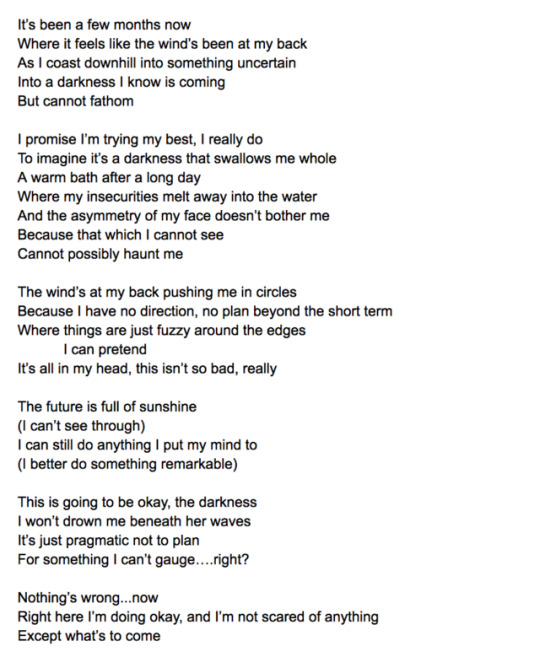
Coasting
3 notes
·
View notes
Text
fair
“life isn’t fair”
was the answer to everything
I couldn’t have when I was a kid
and I truly, honestly, thought
I’d learned that lesson
when I wasn’t the same as everyone else
when my dates were all strangers I’d met online
when there was nobody whose hand I could hold
during the breaks at school
I knew life wasn’t fair
when I didn’t get to go away to school
when I got to watch frosh week on facebook
when I had to put my life on hold, turn 18
in a fucking hospital
I knew life wasn’t fair
when I finally met a good guy
when he was five hours away because
when I was seventeen all I wanted was to escape
so I spent all my time missing him
I knew life wasn’t fair
so damn right I thought I’d learned my lesson
“life isn’t fair”
but nobody said that to me
when I found out how dark the world was going to be
when I had to rethink an entire lifetime
“I can’t believe this is happening to you”
as though life is fucking fair
as though there’s some logic to be applied here
as though I can draw correlations between
all my flaws and my punishment
justify why this could happen
as though if I cured
my vanity, my selfishness
the tides would roll back
and I’d have a future where I could see
I thought I knew full and well
life isn’t fair
and then I smash my head
off a door I didn’t see open
I leap back from a car
that came out of nowhere
and I scream to myself
THIS ISN’T FUCKING FAIR
it’s not fair
life isn’t fair
12 notes
·
View notes
Text
Retinitis Pigmentosa Awareness Month
If there’s one thing I’ve wanted more than anything else in my entire life, it’s been to be normal. That may be hard to believe for most people in my life, given that I’m prone to living in a manner some might describe as dramatic and “unnecessary”. Maybe a part of me realized a long ways back that on some level I was never going to blend in, that I was never going to be quote unquote normal. Growing up, I was never normal. I was the kid with the big hearing aids, the kid with the lisp. When I wasn’t the deaf kid, I was the twin who ohmygod shared a womb with his sister “and isn’t that awesome do you guys share a psychic connection what’s she thinking right now?” (As we’ve grown up, I have developed a keen sense of her moods - right now, she wants wine and carbs). Neither of those things that made me different were inherently bad - they were just things that I didn’t have control over. I’m big on being able to control things in my life (more on that later).
Then of course, when I had maybe just become as normal as I’ve probably ever been in high school, where my identity wasn’t wrapped around my hearing aids or my womb-mate since my teachers weren’t all aware of either, I tuned into my emerging sexuality. So then I became the gay kid. I couldn’t control that, either. But if I wasn’t going to be able to be plain jane normal, I was going to control the narrative the best I could. So I was the school faggot who wore six inch stilettos to class because fuck the patriarchy, amiright? I mean, if I wasn’t going to be able to be normal, I might as well be balls-to-the-wall obnoxious. I sure wasn’t going to blend in with the jocks or the gamers or the preppy girls, so there I was making questionable life choices in zebra print jeans and a leopard print purse. Still, somewhere underneath three inches of caked-on foundation and bleached, blue, green, red, black, damaged hair, all I wanted was to be normal. I clearly wasn’t motivated to put in an effort to make myself normal, because I have all the self-motivation of a sunbathing iguana, but if I’d have woken up one morning with some innate ability to fly under the radar, my dreams would have come true. Nobody said teenage me was good with logic, alright?
Because none of the above were labels enough and because we live in a society where we worship excess, I further became the kid with the eating disorder, the kid whose life basically just frayed at the seams until I was spending my eighteenth birthday in the hospital, where surprisingly, I kind of felt...normal? I mean, not one of us there was normal - we were all twisted by some unknown force, hiding mashed potatoes in uggs, pouring shots of ensure in the carpet, and splashing urine samples on the poor nurses (poor woman coincidentally retired that same year). We had fixations that bonded us, a common experience in the ridiculousness of being told to lick out jam packets and eat the cores of apples (Laura, I’ve been recovered for a while now and you’re still just wrong on that front). I fit in without trying, and it was oddly comforting. When I left treatment, my life became as normal as I imagine it will ever be. I worked two jobs, found myself in a relationship that didn’t careen off the tracks (bless Joey’s heart), and then went away for school. It was the Canadian dream, and it was wonderful. I adored it. I mean, my roommates in Ottawa shat on the floors and made hash with my hair straightener, but I was normal! It was everyone else who was crazy - a true revelation.
Fast forward a few years and we get to the point of all this rambling about my life story. I was studying (lol) at Ryerson and I’d met fellow normals who I did normal university student stuff with like the wonderful normal me wanted. Except my one friend kept telling me I needed to get my eyes checked because apparently I couldn’t see well enough. Like, excuse me? I could see just damn fine thank you it wasn’t my fault other people got in my way or things moved into my path or that cars didn’t pay attention to pedestrians or that sometimes it was just too damn dark outside, okay?. “But no seriously”, Mathew said, “you should be able to see more. It’s probably like glaucoma or cataracts or something, just get your eyes tested”. The man works for Lasik MD, so I immediately heeded his words of advice...like nine months later.
It was now October of 2015, and I was normal, god damn it. I sat with patron saint Joey in an eye doctor’s office with a Louis Vuitton print trash can (I couldn’t make this up, I swear) and a poster of Patrick Dempsey on the wall. “MCDREAMY LIVES” I believe was what Joey said to me. This was a real eye doctor, not just some man my mother, bless her heart, was harboring a not-so-secret crush for. I sat through what seemed like a ridiculous number of tests that featured some eye drops that truly made me unable to see - I haven’t sent so many misspelled texts since the drunken lead up to my hospitalization.
My first sign that “whoops, maybe Mathew was right” was when I was doing a field of vision test where I was supposed to be pressing buttons whenever I saw a flash of light - the visual version of a hearing test I’d been doing since I was like four and screaming into a microphone at some poor audiologist who deserved better in life because he wasn’t MY audiologist. I digress. Anyways, the lady running the test kept telling me “so you need to press the button when you see the light. Do you see the light? You have to press the button! So you know to press the button? Press the button!” In my mind I was cussing her out - “GURL I AM DOING THE BEST I CAN I HAVE PRESSED THE BUTTON A MULTITUDE OF TIMES I HAVE SEEN LIGHTS” - but in reality, “yes. I understand. Gotcha. *click*. *click*. Want to feel like an imbecile? Sit in front of a machine with your face in a cage and listen to someone dispassionately remind you that you need to press the button blah blah blah.
Finally at long last, Gentle Male Eye Doctor (GMED) sat down with me to discuss the results of the test I had clearly failed like I had grade 11 chemistry. “So, you see this picture here? That’s your retina. These little lines here are *eye doctor jumble I could not reproduce for the life of me*. Your visual field test reinforces my first thoughts when I looked at these images”. Sure, GMED, tell me all about my cataracts so I can get Mathew to get me a sweet discount and I can get back to my normal life. “It looks like you have retinitis pigmentosa”. Screech. Hands up, y’all, if you’ve ever heard of retinitis pigmentosa before. Zero? Good, we’re all on the same page here.
“It’s a genetic degenerative condition”
“I’m guessing from the look on your face, that’s not a good thing?”
“No.”
“So how do we like, deal with it?”
“There’s no cure”.
“Okay, but like how do we treat it to keep it from getting worse?”
“Well...there’s not really anything we can do. I’m going to refer you to a retina specialist. Don’t google it, okay?”
“Sure.”
So I went to pay, kind of just shell shocked because how exactly are you supposed to fucking process something you don’t know about? Turns out I now get free eye exams because of my condition (it’s all coming up sunshine for #sashagay!).
What’s the first thing I did when I got home? Did I
A) Have a healthy snack
B) Read Great Expectations for class
C) Go for a light jog
D) Google what the fuck retinitis pigmentosa is
The correct answer, of course, is D. (When is D not the answer to everything? - I couldn’t resist) I remained #chill the best I could, because I had not yet seen a retina specialist, which I still wasn’t sure was a legitimate thing, nor had my diagnosis confirmed.
That’s a lie. I was #unchill. Before I’d had my formal diagnosis I knew all about RP and all sorts of fun (read: scary) facts about it. And then they confirmed my diagnosis. I am going blind. Retinitis Pigmentosa is, as GMED stated, a genetic degenerative eye condition. In laymans terms, you start with a loss of night vision coupled with a loss of peripheral vision.
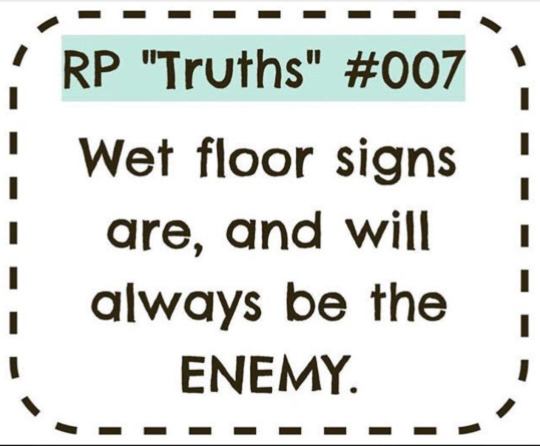
If nothing else, I know now I’m not the only one who hates those damn signs
I wasn’t walking into “caution when wet” signs and TTC station employees and small children and off curbs and into oncoming traffic because of a lack of grace. I had been losing peripheral vision that would have allowed me to see all of the above. Other people didn’t just have superior night vision like some freakshow - they just had normal eyes that saw trees, stairs, and again, small children. (If you take nothing else away from all this, take away the knowledge that small children are the worst). Again as GMED had said, there is currently no treatment. There is no cure. I will continue to lose my vision at an undetermined rate until I am first legally blind, and eventually completely blind.
In many ways, I am incredibly lucky. My visual acuity - the field of vision in which I can see - is pretty damn good. I can see the world around me and as of yet am largely unaffected by my condition. I have no problem reading, walking around my neighbourhood, or doing my job. I’m pretty much as normal as I was before - for now. I will never be able to drive (GMED looked like he might faint when I told him I’d driven to my appointment until I clarified that Joey was behind the wheel). I’ll never be able to see the stars at night, or go to the movies without feeling like I’m in some sort of Survivor challenge. And I’ll become, eventually, more and more reliant on using assistive devices to get around and do the things I can do uninhibited today. At my last eye exam, a different doctor told me that A) I have a field of vision of approximately 50 degrees, having lost about two-four degrees of vision in the last year, and that B) given a continual degree of degeneration, I will be lucky if I make it to 35 before I become legally blind.
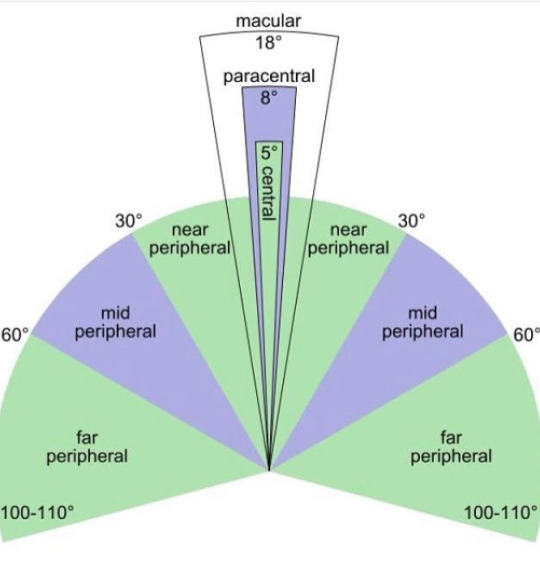
So if you look at the above diagram I have so helpfully provided, you’ll see what my vision loss at this point looks like. I have approximately 25 degrees of vision in each eye - so slightly less than the full thirty degrees of ‘near peripheral’ vision a person with no visual impairment would have. Legally blind is 20 degrees of peripheral vision, so about the triangle you see labelled here as macular vision.
Retinitis Pigmentosa isn’t a super common condition - something like one in 4,000 people have the condition, but even that isn’t confirmed. There’s not really a ton of research out there, so the information available isn’t totally reliable. General consensus seems to be that those of us with the condition lose the majority of their vision in their twenties (that’s me!) and 90% of us are legally blind by the age of 40, both of which align with what my doctor told me. So that’s what I’m essentially basing my outlook on: having approximately 12 years until I’m considered legally blind, with a steady (or rapid???) rate of decline in my field of vision until then. It’s a weird situation.
I finished out my last year of university as a “normal”, basically acting as though nothing has changed. Today, I am qualified to tell you I have a bachelor’s degree in English. That’s it - there’s really not much else that degree qualifies you for, in all honesty. Just after that, I finally set up my referral with the Canadian National Institute for the Blind. I’ve taken Orientation and Mobility training where I’ve learned how to use my white cane. When I’m out in the dark, in crowded places, or just unfamiliar places, I use my cane to let other people know I’m a public menace (that’s not meant to be a jab at other visually impaired people; my condition truly manifests itself in me being a danger to children and those little wire baskets at Shoppers Drug Mart) and to help me navigate more effectively.
I should clarify a few things. I’m not ‘normal’ any more, and I won’t be any time in the future. You win some, you lose some, and I’m pretty much okay with that right now. I can still see. I’m not legally blind. If I’m out with my cane, it doesn’t mean I’m 100% blind. I will, sir, be able to see you pulling out your fucking polaroid at the subway station to take a picture of me from three feet away. (True story. I looked damn cute that day, though, so can we blame him?). I’m visually impaired, so I do walk into a lot of things and people. I will miss you waving at me from five feet away, since I can’t see to either side of me and I’m usually focused on trying to see what’s in front of me. I can still beat my face like a RuPaul’s Drag Race reject, but I can’t ride a bike by myself. I can still go to work and do my thing, but I can’t see you handing me something. I can still text, use my computer, put together a cute lewk, and be an internet sensation, but I can’t find anything to save my life. Where’s my hearing aid? Where’d I leave my phone? What did I do with my lighter?
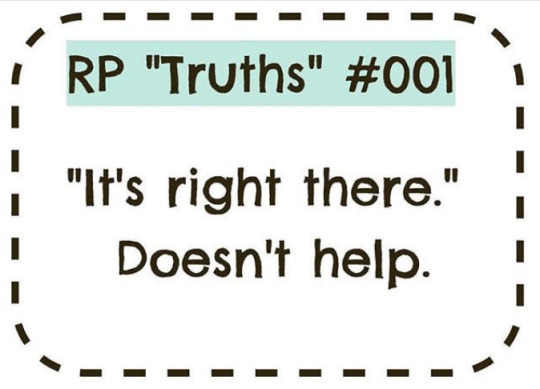
Trying to help me find something? Keep this in mind so I don’t hulk out on you
Game over. It takes me forever to find anything, because my eyes don’t scan the way someone who isn’t visually impaired would be able to. My boss likes to play a game on her iPad that has her looking for objects in a dark room with a flashlight that only lights up a small bit of said room- it would be a fun game to try out, except that’s my life. Poor embattled Joey and I went to Mexico last summer and he wanted to try out a ‘eat in the dark experience’ - except that was every dining experience I had, because “ambient lighting” really means “#sashagay comes mere millimetres away from impaling himself and/or giving himself a second-degree burn”.
So, I’ve never been normal. I’m relatively used to being different - it’s just on a bigger scale now. My friends are all graduating university or working their way up in their respective fields; they’re building careers and establishing themselves. For me, that’s a weird thing to think about, because how do I go about building a career when I A) don’t know what exactly I want to do with my life, and B) don’t really know how long I’ll have enough usable vision to work in that career? 80% of people who are legally blind are unemployed - and to me, that’s not unbelievable, because it’s hard to imagine what I’m going to do when I’m blind.
None of this is to say poor pitiful me, give me a pep talk about how I can do anything I can put my mind to. I’m not giving up on my life or any hope for the future. I consider myself a realist. If 80% of people who are legally blind are unemployed, there is a very good chance I will be in that percentage. If my vision is continuing to degrade, the likelihood of my life changing in a dramatic fashion is pretty damn high. People who say “you can do anything! I know a blind person who’s curing cancer, who’s an astronaut, who’s a grammy-award-winning singer” (hey Stevie Wonder!) are trying to be positive and uplifting. But those people are the exception to the rule. Telling me, unprompted, that I am going to be a force to be reckoned with and that nothing will stand in my way, is not helpful. I’ve never had astronomical aspirations for myself - all I wanted was to be normal. If I wasn’t going to win a nobel prize before, I really don’t see it happening anytime soon. It’s not defeatist, because I know I’m going to be okay. I’m going to work on my goals as they come. I’m going to do volunteer work when I can’t hold down a job. I’m going to be a fucking fabulous uncle to my nieces and nephews when they come around. I’m going to raise awareness and fight for the causes I believe in. I’ll just be adding a splash of Helen Keller realness to anything I do.
It’s just a weird situation to be in, to be in your early(ish) twenties and know that you’re going blind. How do you plan for that? How do you build a life around that? I said before: I like to be in control. I’m not. It’s scary. But I’ll be okay. I have an amazing family who would move hell and earth for me. I have Joey, who isn’t going anywhere so long as I can dangle a handicap parking spot in front of him. I have incredible friends and colleagues who would never leave me dangling on my own (except when they forget I can’t see them and turn and walk in a different direction than me - oops). I have new friends I’m making in the community - hey Mara! - who show me that I’m going to be okay, that retinitis pigmentosa isn’t game over.
I don’t have a super cute way to end all this, so I’ll just end off by saying I hope I’ve brought some awareness to y’all with all these words since it is retinitis pigmentosa awareness month. Here’s to not being normal!
17 notes
·
View notes
Text
EDAW 2017
Eating Disorder Awareness Week just ended here in Canada (just missed it by a day!), so I thought I’d sit down and write a lil’ bit about my own experiences. I think it’s important for me to be open about where I’ve been (and where I am now), because I know how much I appreciated others sharing their stories when I was in the midst of my illness and later my treatment. I know how many people I’ve had come to me and tell me about their own struggles, who have felt they could confide in me - because I’ve been open about my past. I think that’s vital.
An eating disorder separates you from the normal world (don’t try to drag me for using neurotypical language/being ableist - there isn’t fuck all that is normal about an eating disorder). It will tear you away from any and everyone else that it possibly can, because much like redneck americans, logic is something an eating disorder abhors. If someone can talk to me about their struggles because I’m still somewhat in their orbit, that means they aren’t completely alone, and that’s a victory. Not a major one, but it’s something.
My friends who have been down similar paths as me know that - every little victory counts, because it’s a long road to recovery, and any little light is something that might help you hold out a little longer. My personal ‘philosophy’ (because now I’m an expert, right?) on recovery is that you’ve got to just slowly shut out your ED and drown them out until their grip loosens. If you talk to the people I was in treatment with, I’m 90% sure they’ll tell you that I was loud and obnoxious and didn’t take it too seriously. (Or that I was a wreck of a human being who needed serious help...which would also probably be true, but I’m trying to make myself sound cute here). That worked for me. For me, taking my eating disorder and the control it had over me seriously would be giving in, if that makes sense. Joking about it gave the voice in my head less to actively battle against. Saying “I am committed to gaining X pounds by X date” gave me something to fight against - saying “I can’t wait to get my period back lulz” was very unthreatening, because, well, I was born with male parts, so if I were ever to get my period “back”, there’d be bigger issues to deal with.
This is going to segue seamlessly (right?!) into a bunch of thoughts I had a few weeks ago during Bell Let’s Talk that I never got around to putting out into the world beyond some tweets (that’s a cue to plug @iamsashagay if I ever saw one). There were a lot of really weird things about being in treatment, but the bit I just mentioned up there? About getting my period back? That was a legitimate thing. It was written there on the pamphlets/guides/scrap paper; the return of menstruation was pretty much the #1 sign that a patient was ready to ‘transition’ and leave the treatment program. It was an easy joke to make - “I guess I’ll never really be recovered!”, but looking back on it now, it makes me cringe a little bit. I mean here I was, a seventeen/eighteen year old dude, and they were telling me that ‘whoops, this program wasn’t meant for you because this is a girl problem”. That’s not fucking comforting when you’re trying to find a safe place in a world where a damn carrot is terrifying, you know?
It wasn’t just that, though. The more I thought about it, the more I realized how poorly recognized eating disorders in guys are, and how that translated into my experience in treatment. I want to be sure, though, to preface this section by saying how grateful I am to all the people I worked with, and how lucky I am to have been given the opportunity to work through the program I did. This isn’t a condemnation of the work they did, but rather a critical analysis (makin’ Professor Janzen proud!) of how outside forces shaped the expectation of what a patient should/would look like. One of my first interactions in treatment was with a doctor who, during my first examination, exclaimed “wow, you really are underweight!”
I mean...she wasn’t wrong.
As a wiser, more mature version of myself, it seems ridiculous to me that any doctor in that situation would comment on my being underweight. Given that my file would have had pages of notes about my laxative abuse, purging, caloric intake, exercise routine, and self-harming tendencies, I’m really not sure what she was walking into. For someone who had been told that I was at a low enough weight that my organs could begin to fail at any point, being told I was ‘actually’ underweight was mildly insulting.
I doubt any girls in my program were greeted with a doctor who was surprised they were actually ‘skinny’ - because that’s acceptable. I, apparently, was not a ‘typical’ patient, and that showed. It was a minor thing, but indicative of a mindset that wasn’t reflective of reality - just like the recovery guidelines about menses returning. Maybe I didn’t look sick enough, - because males lose more muscle mass vs girls who lose more fat mass due to body structure -, but I sure looked as gay as I was. Maybe that’s why when we all got blood tests for nutrient deficiencies and all that, they tested me for HIV, too. I did not request that test. I was told, rather, that “because of my background”, it was necessary. I’d been tested after my last sexual partner - and had told them I was negative. I didn’t fight about it because I had bigger enemies (TWO pieces of toast at breakfast? Kathy, you monster!), but again, that’s reflective of a bigger issue. I wasn’t at the time sexually active, had a negative test under my belt, and nobody else was tested. But because I was a gay male who at some point had been sexually active, the assumption was there that I naturally must have come in contact with HIV, right?
Not to slut-shame (we all know I’m all about sexual liberation), but one of my best treatment friends used to literally show up late saying the subway was delayed so she could go get a morning quickie in with her boyfriend before the day started. (Gurl, you lived one subway stop away I don’t know who you thought you were fooling but I applaud you). I don’t think she got tested. Again, practice doesn’t reflect the reality.
All of this to say that treatment is problematic. It’s far from perfect. It sucks. There’s no dancing around that. I made amazing friends and I have fond memories, for sure, and I’m happy and healthy today. But recovery is more than anything a choice. It is a choice every day to wake up and fight, to try and wrap your head around the petty rules you have to abide by for the greater good. You have to accept a loss of autonomy. They will not trust you, and your voice will be stripped away until you’ve regained some trust - and there are those who will never actually trust you (Anne Marie, what’s good?).
You’ll be three months in, catch the flu, and they’ll tell you that no, you have anxiety. They’ll put you on prozac (which you vomit up because of the flu), and continue to ignore you when you say you have the flu. If you’re especially lucky, they may override everything you say about just “needing a day or two to recover” and instead replace every meal you have with ensure. I was lucky enough to have all the above happen, ending up drinking a delightful SIXTEEN bottles of ensure a day. If any of you want to doubt my dedication to my recovery, I want you to sit down and drink sixteen cans of ensure, two or three at a time, in less than 12 hours, in 15 or 30 minute timeframes.
Anne Marie made me clean up my own exorcist-esque vomit and then questioned my commitment to my recovery when I told her I was going home. That’s the sort of shit recovery is. It’s a lot of sweat and tears and eating when you don’t want to and feeling like a damn beach ball and vomiting and giving up control. It’s also discovering all the people you have in your corner, your parents showing up every week to therapy sessions when all you do is scream and slam doors, the warmest hugs from new friends, building new healthy relationships, laughing without a bottle in your hand, and starting to make plans for the future again. Recovery’s not quick - it’s been over five years since I ‘graduated’, and I only trusted myself enough to go vegetarian a month ago, because eating disorders are that pervasive, and I’ll be damned if I have to do this all over again.
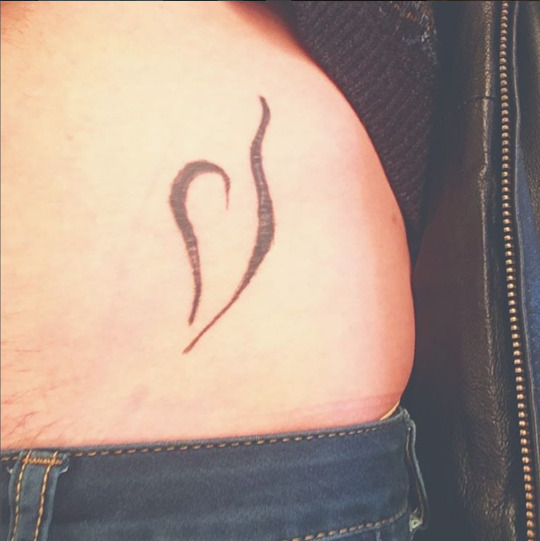
Six years ago, I was less than 2/3 of the weight I am today. Food was a threat, and I was purging just about everything that passed my lips. I was carrying laxatives with me wherever I went. My doctors told me (at 17!) I was at risk of cardiac arrest. The body I have now now doesn't run marathons or inspire envy. It is a body that fought hard to still be here, that is lucky to be here. It is a healthy body. It is a body that can eat dinner with the man I love (who has quite literally been there through thick and thin) without anxiety. It is a body that above all, I love. Six years ago, I couldn't dream of saying that.
If there’s nothing else you take away from this, let it be this: you’re worth recovery. You’re worth the time and investment. If my snotty ass teenage self was, you sure are. I’m here if you need to talk. Love yourself the best you can
3 notes
·
View notes
Text
An Open Letter to Pride Toronto
I’ve been attending pride since I was what I refer to as a ~baby gay~ when I was 15 and newly out of the closet. My first pride was rainy and dismal, but gave me a sense of community I hadn’t quite found before.
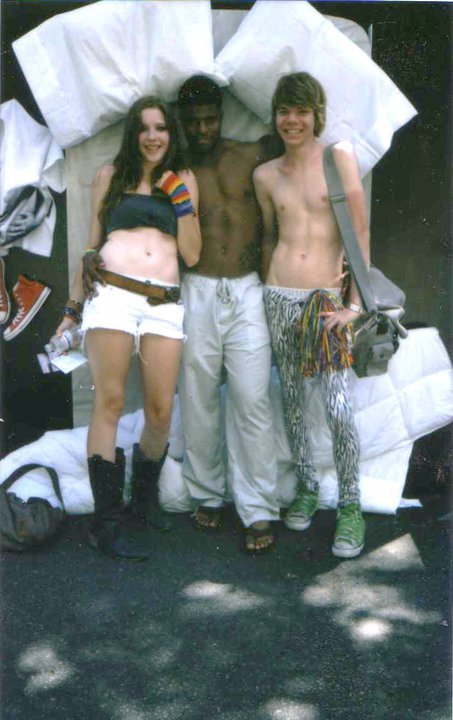
baby sashagay’s second pride
The next year I became a volunteer (I couldn’t tell you doing what, because I was busy trying to impress an ex of mine who coincidentally was on the same work crew as me). I’ve been an active volunteer every year since then, with the exception of two years when I was away at school in Ottawa. I won’t say how many years that’s been, but suffice it to say that I have a solid collection of Pride Toronto lanyards at this point. Since I’ve been sixteen, I’ve been a member of Pride Toronto - I’ve had a voice, a stake, and a role in my community throughout the majority of my out life.
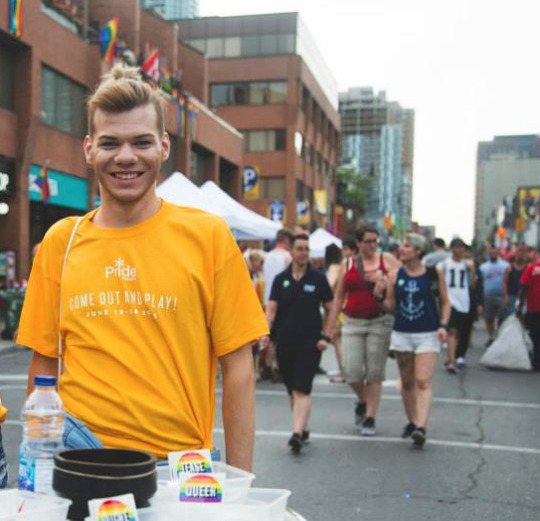
(And since 2015, I’ve been one of the smiling faces on the Pride Toronto website’s volunteer page - my claim to fame).
That said, I’ve never had a lot to say about Pride Toronto’s dealings - I’ve never had any true issues with how they’ve handled contentious matters or the running of the festival every year. As long as I’ve been a member of Pride Toronto, the organization has worked for me. Really, why would it not? I’m a white, middle-to-upper class gay who can easily pass for cisgender. I carry a lot of privilege with me. Those privileges have allowed me to avoid, in all honesty, having to do a lot of heavy lifting or speaking out about our LGBT+ community.
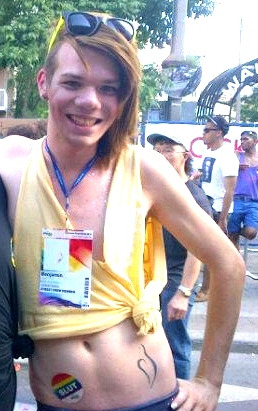
#sashagay investing in pride in 2012
At Pride Toronto’s general meeting last Tuesday, the organization took a turn - now, it seems, the mandate has shifted to work for the more marginalized groups within our community. This is a good thing. I’ve never known a Toronto or Canada as a gay man where I could not marry the man I loved or where my rights were not intrinsically protected. Pride Toronto no longer needs to put my needs and my comfort at the forefront of its operations, because I am largely out of danger. LGB people of colour are not. Trans people regardless of background are not protected by federal laws against discrimination, and the situation for Trans people of colour is complicated further by many different levels of intersectionality too complicated for me to lay out in this piece. These members of our community have too often taken a back seat for ‘the greater good’ of our community. They have fought alongside us for decades, knowing that their battles would not end where ours have. Now, it is time for their voices to be heard, and for us to fight on their behalf.
Since my first pride as a baby gay, I have not a single memory of an unpleasant interaction with a police officer. Police presence has never been a problem for me, a result of the various levels of privilege I have. I have no real reason to distrust or fear police officers or the institution they represent. I am not the voice Pride Toronto needs to be listening to, however. I am not marginalized within my community. I have no stake in whether the police are given a space in our parades and festival, and I have no problem with a lack of police presence within pride. The decision does not affect me, my life, or my enjoyment of all pride has to offer.
Put simply? I don’t care about the police. I care about my brothers, my sisters, and my non-binary siblings of every color.
Do I agree that a ban on police involvement is a perfect solution? Of course not. We do need to build bridges. We do need to mend relationships between communities and groups. We do need to work together to acknowledge the past and move forward in a constructive manner. That said, making Pride Toronto an inclusive event starts within our communities. I’ve heard a lot of cries of “but we can’t exclude the police - that’s not inclusive!”. The problem with that statement is that pride does not exist for the police. It exists for LGBT+ community members. We must make sure that our own people feel comfortable and safe. The voices telling us they are not comfortable with a police presence are not only marginalized in society as a whole, but also within our community. They are the ones who need pride, more than any of the rest of us. If we cannot make them feel welcome and listen to what they have to say, we have failed them as a community.
A vocation, with rare exception, is a choice. Individuals, unless I have been greatly mistaken, are not forced to become police officers. It is also worth noting that as an agent of the government, it really is not possible to discriminate against the police force. You can’t discriminate against someone or something that holds power. Police officers have a say in who they want to be. Our community does not have any other choice than to be who we are. We have not chosen to be Gay, Bi, Trans, people of color, or disabled. That is why in this one community, our voices matter more. For just a few days of the year, the needs and desires of the LGBT+ community take precedence over the outside world.
That is not to say that I don’t have sympathy for LGBT+ police officers in the face of the general meeting vote. I imagine many are hurt, and a few even left feeling betrayed that they have worked to represent a community that appears to now be turning on them. The flip side of that is to consider that there are many members of our community who feel just as betrayed that our own are members of an institution that has historically and continues to subjugate us. It is not an easy situation that can be neatly fixed to everyone’s complete satisfaction. The fact of the matter remains that an LGBT+ police officer can take off their uniform at the end of the day. Some of us do not have that luxury.
What I’ve found most interesting, and in many ways enlightening is that many of the voices I hear crowing about how Pride Toronto has let Black Lives Matter “hijack” our city’s pride...are in essence trying to hijack Pride Toronto. Moreover, they are either unaware of or do not care that they are doing so.
Let me explain what I mean by this. There are people coming out of the woodwork who have not dedicated their time and energy to Pride Toronto, who are not stakeholders in the community (coming out to party for a weekend doesn’t count), who feel that their voices are more important than those of the people who actually make pride happen every year. It is amusing to me to see those who have not invested in to Pride Toronto demand to be given ownership. That, as far as I’m concerned, is hijacking. Expecting to be heard when you, frankly, have no reason for us to do so. Imagine, if you will, a Pride Toronto where the voices heard were not those who had a stake in our community, but rather a Pride Toronto where any Tom Dick or Harry off the street could come and vote on issues that affected us. It would be no different than the outside world, and look how well that tends to go for us.
The sentiment that BLM has ‘hijacked’ us rings false to me as someone who has read up on the issue, who understands how Pride Toronto operates. I fail to see how BLM ‘hijacked’ a meeting that was open to all the members of the community who again, have an active (key word there) stake in the organization. Over 700 members of Pride Toronto showed up and spoke up - and they chose (another key word for you there) to accept a motion that, yes, came from Black Lives Matter. Our. Community. Chose.
So let’s get back to Black Lives Matter and the illusion that they have held a gun to our heads and forced us to sign our names in blood swearing our loyalty to their “domestic terrorism”.
Yes, they stopped the parade last year. Yes, they had a list of demands. Yes, it was controversial. Do I endorse their methods? No. But here’s the thing - it was effective. It forced Pride Toronto to examine our relationship to all those we are supposed to be representing. Do we really think that if BLM had set up a meek little press conference at the end of the parade that their voices would have been heard anywhere near as effectively as they were? “But what they did was wrong!” ...by conventional standards, sure. The thing is, you can’t enact change on a systematic level by trying to work within the system. That itself is why BLM was so successful in making marginalized voices inside the community heard - because they shook the system.
I should also note that this school of thinking is also a big part of why there’s not a lot of sympathy, as I see it, for LGBT+ police officers. If you can’t change something from the inside out, why are you a member of it? It’s a tricky thing.
When Pride Toronto was still a protest, we did not play within the status quo. We, too, pissed people off. And it worked. Look at us all now, having the sumptuous ability to bicker about people protesting our own movement for not being inclusive enough. We at one point did not have a movement to be considered exclusive. Protest is effective.
Also, consider this: why did so many of us all stand proudly behind the Women’s March on Washington yesterday if we’re so upset about BLM? There’s a lot of layers to unbox there, and I urge you to do so.
Our community has evolved since the days when people like me needed to be the forefront of the movement, if only to play respectability politics. Now, our community has spoken, and they’ve actually been heard. That makes a lot of people upset, because it challenges their notions of what pride is about. For the first time since I’ve started attending pride, something is changing. I’ve never known pride to be about protest and bumping heads, because I am fortunate enough that generations ahead of me did that work for me. It’s exciting, and no doubt a little frightening.
But pride is not about complacency - that’s not what it started as, and that’s not what it should become. Change is difficult for a lot of us, particularly in the beginning. The backlash against Pride Toronto has been intense, and will likely continue, given so many seem to think the decisions made were unilateral choices made by some elite force.
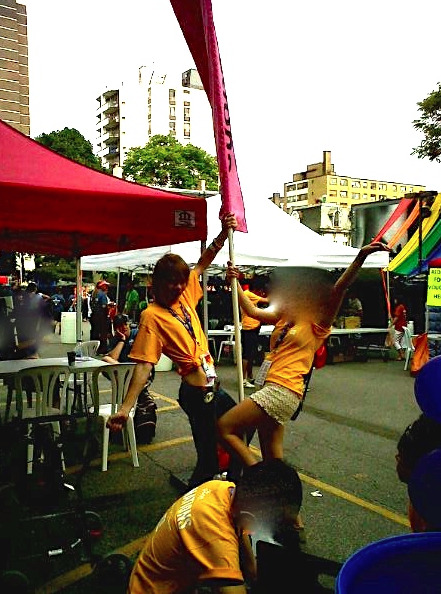
Donations squad 2011 - I’ll be with you again this year making Pride happen
That said, you know what, Pride Toronto? I’m really fucking proud of you (no pun intended). Stand your ground. Pride is not for our allies (see how quickly they turned on us when we got political) or for those content to live within the status quo. It’s for us. For voices that otherwise don’t get to say a hell of a lot. Our voices may not be as loud as the brash onslaught from those who suddenly have a lot invested in pride, but we’re here. We support you, because you’ve supported us. Thank you.
7 notes
·
View notes
Photo
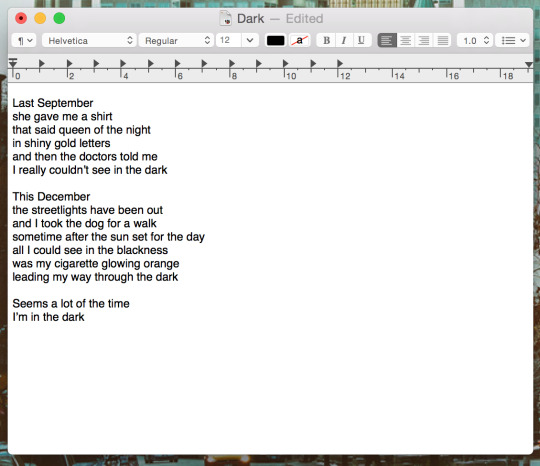
9 notes
·
View notes
Text
Nuit Blanche
in ~honor~ of it being Nuit Blanche tonight, I thought I'd show y'all a lil' something I wrote years ago in one of my high school classes about my first Nuit Blanche. It's very sappy, mainly because I actually had feelings back then. Enjoy #presashagay circa 2010!
There was a feverish air of excitement surrounding us as the subway doors slammed shut behind us, and the train rumbled off to King Station. Pushing and squeezing through the throngs of people, Jason and I made our way off the platform and into the Eaton Centre. The lights were all dimmed, and a small crowd was gathering at the base of an out-of service escalator. Walking closer, Jason exclaimed “Are those glowsticks?”.
And yes, indeed, they were glowsticks. A crowd of about fifty people were participating in an impromptu mosh pit, complete with a DJ and rave children. Much to Jason’s dismay, we forged on towards the outdoors to begin our attempt at finding the friends we were two hours late to meet.
Seventeen phone calls later [yes, I counted!], I heard a female voice shout out my name from behind. Turning around, Jason and I were swept into the arms of our two mildly inebriated friends, Sophia and Kristen. For a few minutes, our small group of art-seers gathered around a massive, roaring bonfire in Dundas Square, warming up. Finally deciding to brave the October chill that surrounded us, we quickly made our way down to Starbucks to obtain warm nourishment to keep us awake through the night. Shelling out money for my venti white chocolate mocha latte in the crowded store, I noticed that we were missing a member of our “wolf pack”.
“Where’s Stephanie?” I asked Kristen. To my chagrin, but not total surprise, she told me about the happenings that had taken place before our arrival. It was the first of several losses of the night. Exiting the store through the rear doors, I handed Kristen her change as she lit a cigarette, asking if Jason and I would enjoy some alone time. Jason nodded vigorously, and I certainly had no objections, so we hugged Kristen and Sophia farewell for the time being, promising to call and meet up with them within the hour.
Setting out alone once more, I grabbed onto Jason’s hand as he guided us through the masses of people, coming to a pause in Nathan Phillips Square. Here, we worked our way onto a ramp in front of an obscure band playing an entrancing electronic melody that filled the night sky. Up above was a huge floating mirror that covered the entire crowd, in which we spent more than a few minutes attempting to find our own reflections, at last spotting my wolf hat, and laughing at our neighbours. Although there was something enthralling about being a part of a living work of art, our feet quickly tired, and the crowd became more and more dense, so we weaved our way back out into the open. Glancing quickly around, an open section of granite bordering the fountain (that transforms into a skating rink come wintertime) seemed an ideal place to park our sore buttocks and rest. Quickly scrambling over, fearful some interlopers might have spotted our spot, we sat down together. Jason’s arms encircling me, the two of us sat and watched people rush by to find more spectacles in the night. Large projector screens displayed moving pictures and images coinciding with the music. A voice came over the loudspeaker, welcoming us all to get to our feet and sing along as the band paid tribute to Neil Young. Cozy as we were, Jason and I decided to remain firmly planted where we were. Soon the air was alive with the voices of thousands of intoxicated fans singing along passionately, and the screens were now mesmerizing us all with hypnotic shapes folding into eachother.
The crowd showed their appreciation quite vocally as the band concluded the song, and Jason’s lips touched mine. When we parted, vast numbers of people had begun milling around, searching for the next attraction. Feeling an hand on my shoulder, I impulsively jerked away. As I raised my head towards the figure above me, a gravelly, deep voice grumbled at the two of us. “I love you two so much right now.” Stunned, Jason and I remained silent as the man stepped back. “I’m not being sarcastic. God bless you.” Looking at each other, bewildered, other voices began to drift through the crowd. And some of them were let’s just say, less positive than the other man, who had vanished into the mass of people filling the square.
Thoroughly creeped out, the two of us got to our feet, clutching now-empty Starbucks cups in numb fingers. Merging with a crowd being herded as one would herd cattle, we soon found ourselves crossing a deserted intersection blocked off by large yellow fence-type barriers. Shouts from behind us, from people who were definitely nowhere close to being sober, or accepting of “faggots”, as they referred to us multiple times, frightened us into bolting for the Eaton Centre. Gasping and panting from the exertion, Jason and I realised that time had slipped away from us, and it was now almost thirty minutes past the time we were to call our friends back.
Hitting the end call button with more violence than necessary, I declared Sophia and Kristen to be missing in action. Multiple phone calls had all ended with a lovely mechanical voice encouraging me to ask Sophia to activate her voicemail account. “If I wanted to hear a mechanical b***h, I would call a machine”, I grumbled. Taking my hand in his, Jason suggested we find our way back to the bonfire and spend some time there relaxing. It had become official. Our wolf pack had been whittled down to two wolves. We had lost two more fine canines to the wilds of Nuit Blanche.
Sidling up to the fence that separated gawkers from the flames, we noticed a woman giving an amateur photographer a stern lecture about her “personal space”. The poor man tried to defend himself, which only lead to profanities from the woman, who abruptly turned, shoved her little blue earbuds in, and leaned towards the fire. Another gentleman with a camera had the audacity to jostle her, and she turned around in an absolute fury. “Don’t f***ing touch me!” she screamed. The people surrounding her slowly backed away, shooting her furtive looks. A lone security guard bravely stepped into the ring of people beside her, assuring her that nobody meant to harm her. Her voice rising, now becoming a shriek, she insisted that the man had assaulted her, and should be arrested on the spot. With each word, the volume of her words increased, and as Jason and I stumbled towards the subway to make our exit, I could swear I saw the woman throw a punch before the crowd closed in again, and us two wolves became two cattle trodding on home, marvelling at the people who lived among us, and bemoaning the loss of our pack.
1 note
·
View note
Text
Why Orlando Hurts
Let me preface all this by saying that I am only one person - I cannot claim to speak for my entire community, nor do I have any desire to. We all have different stories and different experiences, and that diversity is one of our strengths. Similarly, if this doesn’t ring true for you, let’s talk about it. Let’s learn from each other.
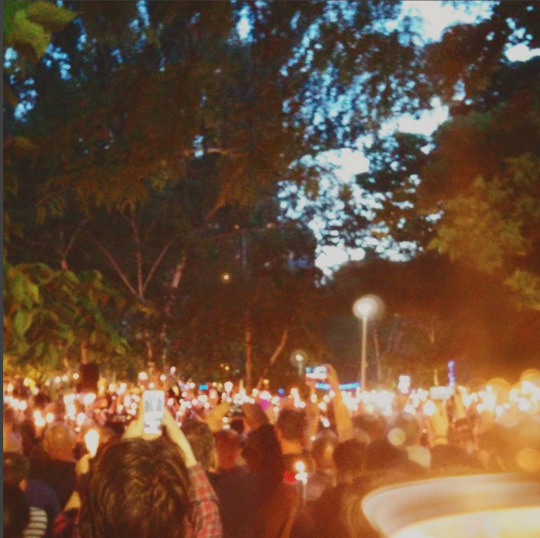
(Last night’s vigil in Barbra Hall Park in downtown Toronto.)
By now, pretty much everybody with access to the internet has heard about Orlando. We’ve heard that fifty people were gunned down by a man in what can only be accurately described as a hate crime motivated by homophobia. In addition to that, the attack took place on a Latinx night at Pulse night club, something that cannot be discounted. As a community, it hurts. We’re scared. We’re sad. And for a lot of us, we’re not just mad - we’re pissed off.
The LGBT community does not have a gentle history. In North America, many link the beginning of contemporary gay struggles to the Stonewall riots in June of 1969. Those riots marked the beginning of a movement that has sought visibility and inclusion, as well as the roots for many Pride celebrations, which are held in June to commemorate those events. In Toronto, it was Operation Soap that largely kick-started the Canadian gay rights movement in February of 1981. The nighttime raids of bathhouses saw over 300 individuals arrested-a number that was not again witnessed in Canada until a riot at a hockey game in 2008 in Alberta. While we fought for our rights and our lives, the LGBT community was decimated in the 1980s by HIV/AIDS. There was little (if any) response from officials, and it was years before AIDS was even mentioned by the mainstream. Referred to as GRID (Gay-Related-Immune-Deficiency), AIDS was seen as a “gay” problem. Thousands died, and it didn’t “matter” until it began to affect the general population. Even today, HIV/AIDS and the LGBT community remain intrinsically linked. When I came out in 2009, one of the first conversations about my sexuality with my father revolved around being safe and protecting myself from AIDS. The events of the past have shaped our community today.
That said, our history is one that is often overlooked by those who aren’t community members, and as a result, one that younger LGBT individuals who haven’t lived through do not necessarily recognize or identify with. Particularly in my part of Canada, many of my peers and I did not have to fight for our rights. We came out after the legalization of gay marriage. We came out after the protection of our human rights. We came out after the community had fought on our behalf, and we may not have realized their sacrifices. It wasn’t perfect. We faced a lot of harassment, both physically and emotionally. We had to seek out safe spaces and find our communities. But we did find them. That’s a level of privilege a lot of members of our community still don’t necessarily have.
So why does Orlando hurt us, then? Because Orlando is a reminder. We aren’t as safe as we thought. The places we consider safe may not be safe. We still need spaces of our own that we can call safe, to be ourselves. It’s something I didn’t necessarily think about much. Living as a gay teen in the 2010s, I didn’t consider the clubs to be a “safe” space - they were just a place where I could find more people like myself, and maybe find someone to spend some time in a dark corner with. Looking back, it’s clear that those clubs were in fact safe spaces. I couldn’t go to a straight club to find people like me because they weren’t safe (something I didn’t realize fully until the first time I went to a straight club in my late teens).
Orlando reminded us that despite all the privileges we’re afforded here in Canada, we can still be victimized. We are still targeted for who we love, for who we are, and for how we present ourselves to the world. Orlando reminded us that there are consequences. That the guy leaning out his car window to shout “faggot” wants to hurt us. That the concerned co-worker who sighs, exasperated, and asks why “you all have to rub our faces in your gayness” doesn’t view you as her equal. Orlando reminded us all that the little passive things we’ve come to accept a part of our days, something normalized, are threats. It was a rude wake-up call that we still have battles ahead of us.
Less than a week ago, I watched a youtube video from a young white gay male. I watched as he got emotional about people staring at him when he went in public, as he complained about not being able to comfortably hold his partner’s hand. Less than a week ago, I tweeted about how he was victimizing himself - about how as a white gay male in Toronto, he needed to just deal with people staring at him because he didn’t have real problems. I thought that because I get stared at on a daily basis, because I’ve always faced comments and questions about my sexuality and gender, he was being over dramatic. We’ve won the fight, I thought. Who gives a fuck if someone stares? Let them. It’s not like they’re going to do anything. That was less than a week ago. The Orlando happened.
Suddenly, we aren’t safe. Somebody opened fire on our community because he saw two men kissing. Suddenly, someone staring when I hold my partner’s hand is an issue. It reminds me how different some people in society still see us as being. What happened in Orlando could happen here. Someone staring at me on the Finch bus could still be so repulsed, so offended, by my very existence that they see fit to plan to exterminate a group of us. Where our LGBT spaces are supposed to be safe spaces we could be loud and proud, Orlando showed us that they can also be targets for hate.
Orlando re-victimized our community. For those who lived through - survived - Stonewall, Operation Soap, and the AIDS Crisis, it was a throwback to times where they were targeted on a regular, systematic basis. Maybe it made them question how much progress they’d made over the decades. (For what it’s worth - you’ve made leaps and bounds of progress for our community, and I’ll be forever grateful to you for it). For those of us who have been relatively sheltered, it made our experiences with bullying and harassment take on a much more sinister tone. For some of us who came out later in life when we were more established (read: after high school especially), it’s opened our eyes to the vulnerability living openly as an LGBT individual exposes. It’s made all of us look over our shoulders.
Orlando hurt us because it showed us how essential our community still is. We need each other, because nobody understands our shared experience the way we do. Our allies, for all they may clap themselves on their backs for supporting us, are not affected the way we are. Orlando was another shooting for them. For us, it was years of microaggression come to fruition in the most deadly way possible. Orlando showed us we needed our LGBT community, because our allies didn’t have our backs the way we needed them to. We had allies who, in our time of need, turned on us for not protecting their feelings. The straight friends who were more than happy to go to gay clubs with us out of convenience were hurt we did not first consider their feelings when we spoke out against the injustices faced by our community at the hands of the hetero and cisgendered majority. We were told to “ensure our message is always positive”. We were told we needed to be better at being ourselves because of “those who are looking to you for guidance and support”. We needed our LGBT community because we were told how we should grieve, how we should express ourselves, and what we could be angry about.
Orlando reminded us that we need our LGBT community because those in positions of power will exploit us for their own agendas. It reminded us that we are so often voiceless. It reminded us that our existence was not a priority for many until our existence benefitted hierarchal systems of power that exploited our brothers and sisters. The coverage that continually ignored our existence, our hurt, our deaths, reminded us that we need to stand up for eachother as one. Nobody else is going to.
Orlando hurts. But Orlando also gives us reason to reflect. In the wake of the shootings, I was so proud to see so many members of my community - my family - rushing forward to denounce Islamophobia. To stand in solidarity with members of the muslim community who the media would make scapegoats for our society’s ingrained homophobia. Orlando gives us an opportunity to educate ourselves on our history so that we know as much about what happened at the Up Stairs Lounge in New Orleans in June 1973, where 32 members of our family were murdered by arson. Orlando is an opportunity.
Orlando hurts, because there’s a lot to process. Because we’re furious and we’re devastated, and we don’t have a particular outlet or target for those emotions. I spent last night at a candlelight vigil in downtown Toronto, and I was awed by the number of people who came out. I was humbled by the sheer amount of love and respect on display. Orlando hurts. We hurt. But community heals. Love heals. Solidarity heals.
8 notes
·
View notes
